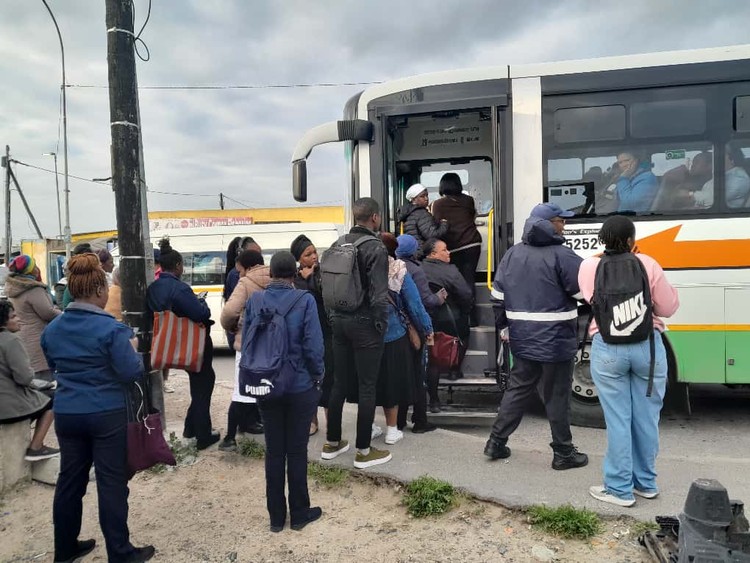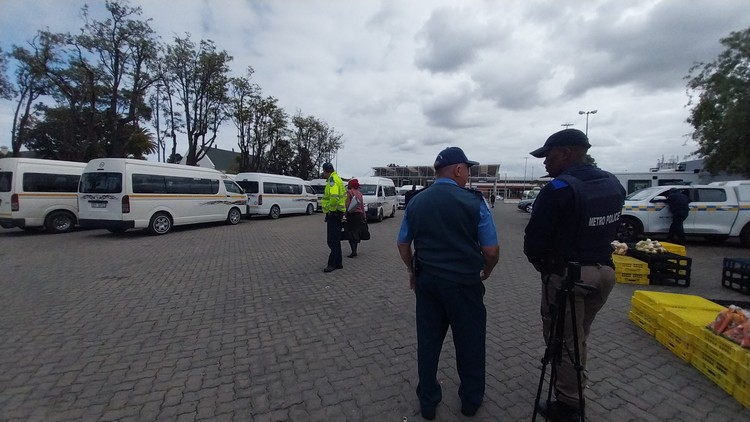Commuters scramble as 30-day taxi shutdown begins
Ten routes from Khayelitsha to Somerset West suspended amid escalating violence
Commuters in Makhaza pile into a full bus headed for Somerset Mall. Photo: Vincent Lali
- A 30-day suspension of taxi routes running from Khayelitsha to Somerset West came into effect on Wednesday.
- This comes after eight people have been killed in violence between taxi associations CODETA and CATA.
- Workers and learners will have to rely on overcrowded buses or an extensive detour by train.
Hundreds of people had their daily commute from Khayelitsha to Somerset West disrupted on Wednesday as a 30-day suspension of taxi routes came into effect.
The Western Cape Mobility Department decided to suspend ten routes by invoking Section 91 of the National Land Transport Act, amid escalating violence between warring taxi associations, the Cape Organisation for the Democratic Taxi Association (CODETA) and the Cape Amalgamated Taxi Association (CATA).
Eight people have been killed: six were killed in incidents between 23 and 26 August; a taxi boss, who was also a SAPS officer, was killed in Somerset West on 4 September; and another taxi boss was killed in Browns Farm on Tuesday.
Routes and some taxi ranks were closely monitored by police and law enforcement officers. Operators who defy the suspension face fines of up to R5,000 or six months in prison. At least six taxis were impounded on Wednesday for breaking the rules.
The Western Cape government has advised commuters to use either buses or trains. But there is no direct train line from Khayelitsha to Somerset West. Commuters would have to go to Bellville first to get onto the Northern Line to Somerset West. Golden Arrow Bus Services has made more buses available on its Somerset West route.
Workers and learners trying to get to Somerset West on Wednesday told GroundUp they had to wait at bus stops far from their usual pick-up points, with some waiting for hours to get to work or school. Others stayed home out of fear that taxi violence could erupt again.
Noluthando Tonjeni, who works in Somerset West, said buses arrived late and were mostly full. A two-hours wait for a bus made her late for work on Wednesday morning.
“Because this was the first day, I asked my two children, who also attend school in Somerset West, not to go to school because I did not know what to expect. They will remain at home until I am satisfied that the situation is calm,” she said.
Another commuter, Masibongwe Thembeni, said he worried the suspension could drag on beyond 30 days.
“When these two taxi associations fight over routes, the victims are commuters. I am late for work because no direct trains are going to Somerset West,” he said.
Law enforcement officers were stationed at several taxi ranks to ensure routes to Somerset West were not operating. Photo: Sandiso Phaliso
Zuki Nkola, who sells food near Nomzamo Taxi Rank, said that without her taxi driver customers she fears she won’t be able to pay for school transport, food or contribute to her stokvel at month-end.
Mamngwevu Bhekameva, who sells muffins and vetkoek, also said she had no customers. “My food is still here because the commuters are not available to buy them … I want the taxi drivers to resolve their differences and forgive each other.”
The mobility department said in a statement: “We cannot allow our communities to be held hostage by ongoing violence in the taxi industry. Violence will never deliver the results you seek. Only through negotiations and agreement can this industry find lasting stability.”
CODETA spokesperson Nceba Enge said the conflict with CATA was caused by the department’s “failure” to issue proper permits. CODETA holds the permit to operate on route 611 from Khayelitsha to Somerset West, but CATA continues to transport passengers on the same corridor illegally, he claimed.
CATA had not responded to GroundUp at the time of publication.
The mobility department was asked to comment on CODETA’s claims, but responded only with a media statement, which did not answer our questions.
A meeting planned for Tuesday evening between the department, CODETA and CATA was cancelled at short notice. Enge said CODETA was not informed of the reasons for the cancellation.
Support independent journalism
Donate using Payfast

Don't miss out on the latest news
We respect your privacy, and promise we won't spam you.
Next: Thousands of municipal workers take to the streets in Buffalo City, despite interdict
Previous: Explosive letter from PRASA “board member” claims tenders are being rigged
Letters
Dear Editor
The 30-day taxi shutdown is more than a transport dispute – it is a daily crisis for working people. When taxis don’t run, the whole country feels it. A domestic worker from Khayelitsha now has to leave home at 4am to catch an overcrowded bus that still drops her late for work. A Grade 11 learner in Mfuleni misses the first hour of school because her family has no alternative transport. Traders near taxi ranks watch their stalls stand empty.
Government’s decision to shut routes may be aimed at restoring safety, but it exposes a deeper truth: our public transport system is fragile and dangerously overdependent on taxis. Without reliable alternatives, commuters are left stranded whenever conflict flares up.
What’s needed is forward-looking reform, not crisis management. That means:
- Reliable alternatives: invest in rail and bus services so commuters are not held hostage by one mode.
- Conflict resolution frameworks: disputes between associations must never spill into communities.
- Integrated ticketing and scheduling: buses, trains, and taxis should work together, not in isolation.
- Innovation pilots: safe, regulated carpooling and ride-sharing options for essential workers.
Public transport is not just about moving people – it is about protecting livelihoods and dignity. Every late arrival at work or missed school hour chips away at South Africa’s future.
This shutdown must be the turning point. Our country deserves a safe, affordable, and resilient transport system that people can trust.
Dear Editor
It is becoming more and more clear that the current aggressive profit-oriented business model of taxis in South Africa is proving to be its own undoing. By allowing these companies to maintain a primary goal of profits and growth, it will always result in conflict between competing businesses, which is neither safe nor efficient for commuters relying on these services.
The unfortunate victims here are the drivers themselves who lack reliable salaries, safe working conditions and trustworthy higher ups. They are the ones who bite the bullet and endure the most hardship when profits dry up, and they are ultimately targeted. It's not like taxi drivers want to compete and fight and kill – they're just people trying to earn what they need to live.
It is my hope that drivers see this and understand that the situation is manufactured by the people up top. If commuter drivers unionised together across organisational lines and took control of their own work in order to control their income, they could organise horizontally with fellow drivers and manage their routes fairly. They may just have a solution to the constant threats, fear and uncertainty they face on a day-to-day basis.
© 2025 GroundUp. This article is licensed under a Creative Commons Attribution-NoDerivatives 4.0 International License.
You may republish this article, so long as you credit the authors and GroundUp, and do not change the text. Please include a link back to the original article.
We put an invisible pixel in the article so that we can count traffic to republishers. All analytics tools are solely on our servers. We do not give our logs to any third party. Logs are deleted after two weeks. We do not use any IP address identifying information except to count regional traffic. We are solely interested in counting hits, not tracking users. If you republish, please do not delete the invisible pixel.


